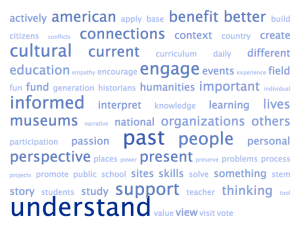Last Friday, January 3, about 65 people braved the winter cold of Washington, DC (okay, compared to Midwest right now, it’s balmy) to participate in a discussion on the relevance of history to Americans. Leading the discussion with me were Tim Grove of the Smithsonian Institution and Cathy Gorn and Kim Fortney of National History Day.
It was an exciting mix of participants. The room was not only filled with historians who were attending the American Historical Association conference, but also people who work at history organizations in the DC region. These various perspectives sparked a convivial and lively discussion (especially when we debated the difference between opinion and perspective).
Our discussions focused on four different areas. The first examined the potential longterm benefits of making history more important and engaging to Americans. As in previous sessions, there was no consensus but they seemed to fall in several major areas:
- Know the individual and society benefits of broad historical study and engagement.
- Know history.
- Builds historical thinking skills.
- Apply historical thinking for the benefit of themselves and society.
- Understand historical perspective.
- Feel connected to others.
- Feel pride, confident, and inspired.
- Engage in democratic and civic processes.
We then solicited their reaction to the five Big Ideas that came out of previous discussions. No one had any comments about “developing critical thinking skills,” but “forming identity,” “encouraging civic engagement,” “building leadership,” and “creating a legacy” received lots of attention. The major comments concerned how these ideas are (or are not) unique to history (e.g., leadership happens in sports and Scouts, too), they seem to be overused jargon (e.g., “civic engagement”), and imply exclusiveness. The term “legacy” seemed especially troublesome and in need of clarification. Some alternatives suggested were plural forms (e.g., identities and legacies), defining whose identity or legacy, and substituting civic or leadership with community, connections, or participants (everyone can’t be a leader). Several people suggested that relevance and meaning must go beyond the individual and personal interest to include the broader community (e.g, “identity can’t stop with me”). We also received several suggestions to add the value of history in building confidence, pride, and independence; that it recognizes change over time in context; distinguishes what is significant; identifies things what happened in the past that affect life today; and have an emotional and affective impact (e.g., joy, entertainment that comes from doing history, and empathy of other people past and present).
To our list of potential stakeholders and activists in this effort, we received suggestions of groups that focus on non-American history, for-profit groups such as Ancestry.com, the Gilder-Lehrman Institute, Khan Academy, textbook publishers, tribal groups, and library societies.
Finally, we asked for examples, model projects, and case studies where history is being made relevant and meaningful and received a long list of ideas, most we had never considered, including:
- UTeach at University of Texas at Austin: STEM teachers required to take “Perspectives,” a course on the history of math and science.
- “Journey to Greatness: Character Lessons from the Past,” a cooperative project between the National Alliance of Faith and Justice and Lincoln Home National Historic Site: working with underserved local schools, impact being studied by psychologists
- Northern PA community website started by high school students with community input (need more details)
- Service Learning Projects in the Journey Through Hallowed Ground Partnership, which include peer-to-peer vodcasts at NPS sites
- Top Ten Things Employers Look for in New College Graduates from the Association of American Colleges and Universities (many of these result from historical thinking skills)
- “Finding Community,” a project to engage diverse audiences in a historic house in Connecticut
- Brooklyn Historical Society working with teenagers in after school and collaborative programs.
- “Constitution in Action” program at National Archives
- Civil War Read-In at Washington State Historical Society
- Scholar participation at projects supported by NEH and state humanities councils (need more details)
- Fort Snelling (Minnesota Historical Society) (need more details)
- Colonial Williamsburg (need more details)
- Law, Justice, and the Holocaust program at the Holocaust Museum provides continuing education classes for lawyers (putting genocide in historical context)
- Society for the History of Medicine providing continuing education classes for lawyers (need more details)
Thanks to everyone that participated and if you’re not familiar with the History Relevance Campaign, you’ll want to read my earlier post or join the group on LinkedIn. Our next scheduled session is at the annual meeting of the National Council on Public History in March 2014.


This is a great summary. Thank you, Max. I’m sorry I missed the session;
I’d add to this list the Civil War Washington Teacher Fellows program, run by a consortium here in D.C., that works to engage teachers in thinking about how the history of the District is linked to its present state from a variety of perspectives, and how they can engage their students in that thought process. You can learn more at the websites of: Ford’s Theatre (www.fords.org); Frederick Douglass National Historic Site (www.nps.gov/frdo); President Lincoln’s Cottage (www.lincolncottage.org); and Tudor Place Historic House (www.tudorplace.org).
LikeLike
Thanks, Sarah! Great suggestion.
LikeLike